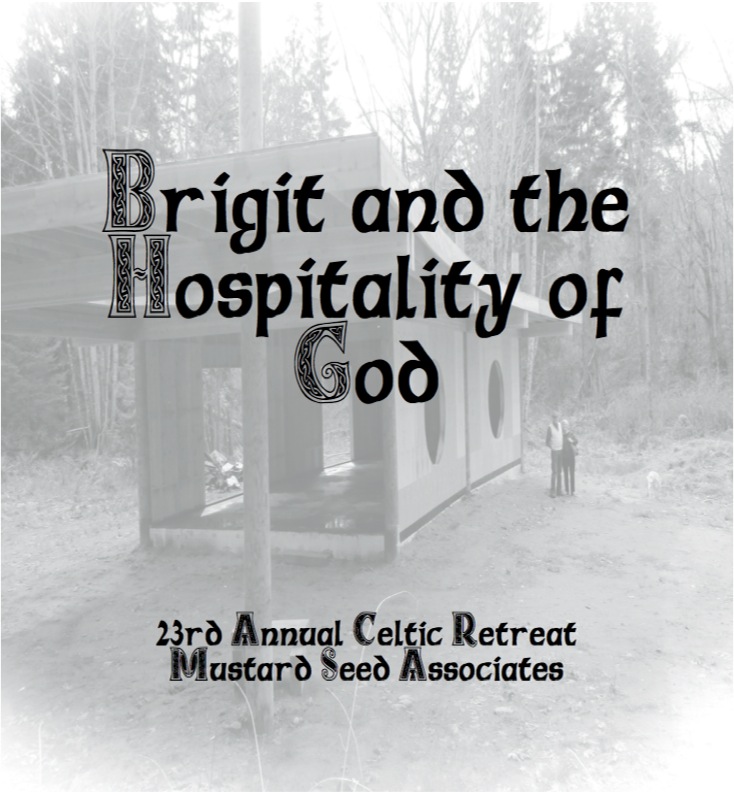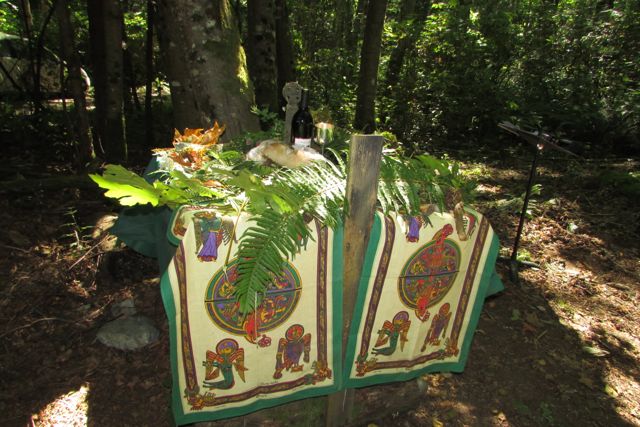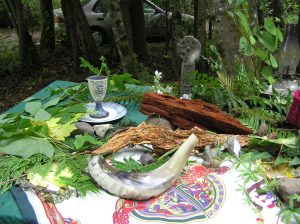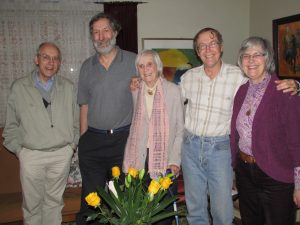The second litany we used on Saturday incorporated a couple of ancient Celtic prayers and the practice of lectio divina. We adapted this practice so that participants had time alone, time in small groups and then time to share in the whole group. It was a powerful and productive time for all of us. And you might like to check out the first litany from our morning gathering too.
The Celtic Christians believed that hospitality was not only meant to be a custom in their homes, it was a key into the Kingdom of God. To offer hospitality was seen as receiving Christ into their midst and fulfilling the law of love. Brigid, who presided over the monastery at Kildare, was particularly known for her generous hospitality. As a child she often gave away her parents possessions. At Kildare, Brigid often made butter for visitors. Tradition has it that when churning the butter she would make thirteen portions – twelve in honour of the apostles and an extra one in honour of Christ which was reserved for guests and the poor.
Let us sit in silent prayer for a moment to remind ourselves of the incredible hospitality of God who invites us, together with all creation, into the divine presence and into eternal family.
(Silence)
God, we are aliens and sojourners in this world, but you invite us to be your guests.
You lavishly offer us your hospitality and lovingly welcome us into your family.
You invite us to share in the abundance of your eternal world,
And welcome us to your banquet feast.
The King is knocking.
If you desire your share of heaven on earth,
lift the latch and let in the king of Kings.
God you show us that hospitality opens doorways into your eternal world.
Whether the sun is at its height, or the moon and stars pierce the darkness,
May this place be always open.
May it never be closed to anyone, lest we should close it to Christ himself.
Whether our guests are rich and noble or poor and ragged,
No matter how small our larder, may it always be open.
May we never refuse to share our food, lest the Son of Mary should go hungry.
Pause to remind yourself of ways that God has extended hospitality to you.
Song – Brigid’s Feast
God we want to fulfill your law of love and be your hospitality to our world,
We open our hearts to be the hospitality of Christ to all who come to our door.
We open our hearts to Christ in the stranger,
To Christ in the faces of colleague and friend.
We open our hearts to the ones who are wounded,
To Christ in the hungry, the homeless, the lonely
We open our hearts to the ones who have hurt us,
To Christ in the faces of sinner and foe.
We open our hearts to those who are outcast,
To Christ in the broken, the prisoner, the poor.
We open our hearts to all who are searching,
To Christ in the world, God’s generous gift.
Pause to remind yourself of ways that you could extend God’s hospitality to others.
Song – Brigid’s Feast
Generous God, take our ordinary everyday lives as pleasing sacrifices to you.
Hospitable and welcoming God, encourage us to fix our attention on you,
So that we will be changed and renewed from the inside out.
God we want to love you more and become your hospitality to our world.
God transform us into the generous, hospitable people you intend us to be,
Let your welcoming love flow from the center of our being,
Let it reach out in friendship and compassion for the disadvantaged and marginalized.
God we want to love you more and become your hospitality to our world.
Open our eyes to see the beauty hidden in every face,
Assist us to practice hospitality to those we usually overlook or ignore,
Let us share your abundance with joyful and grateful hearts.
God we want to love you more and become your hospitality to our world.
Song – Brigid’s feast
Introduction to Lectio Divina
Open your word, O Lord,
Enable us to listen.
Open our minds, O Lord,
Enable us to hear.
Open your thoughts, O Lord,
Enable us to respond.
Open our hearts, O Lord,
Enable us to enjoy.
Scripture Readings
Isaiah 25: 6-10 The Message
But here on this mountain, God-of-the-Angel-Armies
will throw a feast for all the people of the world,
A feast of the finest foods, a feast with vintage wines,
a feast of seven courses, a feast lavish with gourmet desserts.
And here on this mountain, God will banish
the pall of doom hanging over all peoples,
The shadow of doom darkening all nations.
Yes, he’ll banish death forever.
And God will wipe the tears from every face.
He’ll remove every sign of disgrace
From his people, wherever they are.
Yes! God says so!
Also at that time, people will say,
“Look at what’s happened! This is our God!
We waited for him and he showed up and saved us!
This God, the one we waited for!
Let’s celebrate, sing the joys of his salvation.
God’s hand rests on this mountain!”
Regathering Song: A feast of food & finest wine
Luke 14:16-24 The Message
There was once a man who threw a great dinner party and invited many. When it was time for dinner, he sent out his servant to the invited guests, saying, ‘Come on in; the food’s on the table.’ Then they all began to beg off, one after another making excuses. The first said, ‘I bought a piece of property and need to look it over. Send my regrets.’
“Another said, ‘I just bought five teams of oxen, and I really need to check them out. Send my regrets.’ “And yet another said, ‘I just got married and need to get home to my wife.’
The servant went back and told the master what had happened. He was outraged and told the servant, ‘Quickly, get out into the city streets and alleys. Collect all who look like they need a square meal, all the misfits and homeless and wretched you can lay your hands on, and bring them here.’
“The servant reported back, Master, I did what you commanded—and there’s still room.
“The master said, ‘Then go to the country roads. Whoever you find, drag them in. I want my house full! Let me tell you, not one of those originally invited is going to get so much as a bite at my dinner party.’”
Regathering Song:
Lord Jesus Christ, you welcome us to your banquet table.
May we open our arms to embrace you,
May we see you in the faces of strangers,
May we welcome you in the love of friends.
You welcome the abandoned, the misfit, the excluded to your feast.
Forgive us for the times we have allowed our prejudices to overrule,
And rejected you because you are different, ostracized or despised.
We believe that there is beauty hidden in each person.
Forgive us for the times we have failed to see you,
Because you are hidden in the face of the disabled, poor, and homeless.
We believe we are all precious in your sight.
Forgive us for when we have counted you unworthy of our love,
For when we have been indifferent to your cries.
We believe we are called to share life together as members of one family.
Forgive us for when we have been unconcerned for your suffering,
And failed to see your face in the diverse members of your worldwide community.
All humankind is created in God’s image, redeemed by Christ, filled with the Holy Spirit.
We are all invited to feast at God’s banquet table.
We are welcomed into God’s eternal kingdom, with all the peoples of the earth.
The hospitality of Saint Brigid, a giving in and of Christian charity, offered such a powerful example that it set the standard for the hospitality of the Irish people, as is reflected in the Irish Rune of Hospitality:
I saw a stranger yesterday;
I put food in the eating place,
drink in the drinking place,
music in the listening place,
and in the name of the Triune God
he blessed myself and my house,
my cattle and my dear ones, and the lark said in her song
often, often, often,
goes the Christ in the stranger’s guise,
often, often, often,
goes the Christ in the stranger’s guise.
May we follow Saint Brigid’s example and receive Christ in the stranger’s guise.
Pause to pray for people to whom you would like to offer God’s hospitality.
Song – Brigid’s feast
May the blessing of the five loaves and the two fishes,
Which God shared out among the five thousand, be ours.
May the King who did the sharing ,
bless our sharing and our co-sharing.
The blessings of God be upon this place,
With plenty of food and plenty of drink,
With plenty of beds and plenty of ale, with much riches and much cheer
With many kin and length of life ever upon it.
Amen
Many of you have told me how much you would like to be at our Celtic retreat if you were closer so over the next couple of days I will post the various liturgies from the day. This is the first.
The second morning litany is posted here.
The litany from the afternoon gathering.
Morning Gathering
Welcome and introductions
Welcome song – Holy Holy Holy
Welcoming litany
Creator God, loving God,
source of all life,
Compassionate, caring and generous One.
We gather in this place of your amazing generosity,
Surrounded by your rich abundance and lavish hospitality,
Hospitable and welcoming God,
We give you thanks,
for all you are and all you give to us,
through this visit in your creation.
We are blessed by your wild hospitality all around.
Berry-laden vines surround us,
Wild salad greens flourish underfoot.
Rich soil teeming with microscopic life,
Majestic trees nourished by its goodness,
Lush ferns growing in their shade.
Let us taste the goodness of our Creator,
And drink in the wonder of Christ’s sacrifice.
Let us eat of the fruits of the Spirit,
And partake of God’s overflowing generosity,
Let us join in the banquet feast of God.
In Jesus, you place the gospel at the center.
Together with Brigid, Columba, Patrick and Hilda,
you draw all of life into the sacred circle of your redeeming love,
through which all creation is related.
Jesus, you welcome all creation to your banquet feast.
Let us remember we sit at table with the oppressed and the marginalized,
And learn to share your generous and compassionate ways.
Nourished by faith, hope and love,
Let us welcome all who hunger and thirst,
Let us taste of the fruit of your spirit together.
Instructions for preparing the Altar
Let us gather items that speak of God’s generosity and wild hospitality.
Let us prepare the altar together together.
At this point we go out to collect material from the land to decorate the altar.
Sending prayer
God who created from nothing all that we see around us,
And wove together all plants and animals in intricately connected ecosystems,
Restore us, refresh us, renew us, create a generous spirit within us.
As we gather from your bounty to build your altar,
May we build together in a spirit of caring, unity, and hospitality.
Let us taste the goodness of our Creator,
And drink in the wonder of Christ’s sacrifice.
Let us eat of the fruits of the Spirit,
And partake of God’s overflowing generosity,
Let us join in the banquet feast of God.
Song – Go in the wilderness
Go out to collect items for decorating the altar
Children gather afterwards with Ann & Cory for the children’s program.
Song – Brigid’s Feast (composed by our worship leaders Matt and Sundee Frazier.)
God bless the poor. God bless the sick.
And bless our human race.
God bless our food. God bless our drink.
All homes, oh God, embrace.
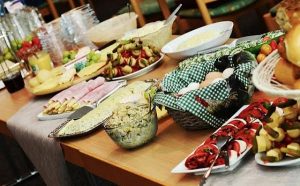
Today’s post is another in the series Hospitality Opening Doorways to the Kingdom, which will once again be out them for a while. It is from April Yamasaki. April is a pastor, writer, and blogger. Her most recent books are Sacred Pauses: Spiritual Practices for Personal Renewal (Herald Press, 2013) and Ordinary Time with Jesus (CSS Publishing, 2014). She blogs on faith and writing at aprilyamasaki.com.
As a church, we’ve experimented with nurturing hospitality in a number of different ways:
- from all-church potlucks to youth progressive dinners;
- after-worship coffee times in summer and getting-to-know-you suppers hosted in homes;
- ESL (English-as-a-second-language) garden parties and weekday morning Chai ‘n’ Chat.
One of our latest experiments is a monthly Guess Who’s Coming to Sunday Lunch potluck. There’s a core group of about fifteen of us who take responsibility to invite others, bring food, do set up, clean up, and compost. We’re intentional about being aware of newcomers and inviting them to join us, plus the worship leader for that Sunday offers a general invitation for any guests.
Not everyone in the core group is there every time, but we’re often joined by others in the congregation who bring a dish to share. With our focus on newcomers, our Guess Who Lunch might be anywhere from 20 to 50 people–from babes-in-arms to seniors, both newcomers and hosts. We do it as a true potluck without coordinating who’s bringing what ahead of time, but somehow there’s always enough food, enough people to help clean up, wonderful conversation, the sharing of our lives as we share a meal together.
Since we have after-church coffee during the summer months, our next Guess Who Lunch won’t be until fall, but I’m already looking forward to it!
Below is one of my favourite dishes to share. It works as a main dish or on the side, can be eaten hot or cold, it’s both vegan and gluten-free, quick to put together and cooks up beautifully in the church kitchen while I’m preaching, can be served as is or with the extras listed at the end of the recipe. I pray it will spark some of you own ideas and hospitality.
Southwestern Beans and Corn
Put all the ingredients in a crock pot, stir well, cover and cook on high for 2-3 hours (low 7 to 8 hours).
4 cups cooked red kidney beans
2 cups frozen corn
1 can (14.5 ounces) diced tomatoes, undrained
1 green bell pepper (1-inch pieces)
2 tsp chili powder
½ tsp salt
½ tsp ground cumin
½ tsp pepper
¼ tsp garlic powder
Extras:
Additions to crock pot:
– 1 large onion and 1 clove garlic sautéed in 1 tbsp olive oil (instead of the garlic powder)
– For extra kick: 1-2 jalapeno peppers, diced
Serve with:
– black olives
– sour cream or plain yogurt
– tortilla chips or bread
Some of you may remember that last week I published two posts Visions in an Empty Glass and We Were Created For Change that flowed out of a profound moment with God that I experienced a couple of weeks ago as I gazed at the empty communion chalice. I continue to meditate on those images and God is still speaking to me from them
The chalice that inspired me was handblown glass and today I contemplated the whole process of glass blowing which involves inflating molten glass into a bubble (or parison), with the aid of a blowpipe. Skilled workers are capable of shaping almost any vessel forms by rotating the pipe, swinging it and controlling the temperature of the piece while they blow.
All of us are like handblown glass, shaped by God into vessels of beauty I thought. All of us are molded uniquely, no two the same. All of us are special, lovingly crafted. Some of us are molded as goblets ready to be filled with living water that others can drink from. Others are like windows – transparent and allowing the glory of God to shine through. Others are like lenses, focusing and magnifying the beauty of God. They break the light of God into rainbows. Blown glass comes in all the colours of the rainbow. It comes in all shapes and sizes. It has many uses from purely functional to decorative.
And then of course there is crystal. Compared to glass, fine crystal may be thinner or more decorative because the lead content lowers the working temperature of the glass, making it easier to sculpt. Normally, glass has to be fired to high temperatures with only a short window of time to blow or mold it. The presence of lead lowers the temperature and extends the working time, allowing crystal to be more ornately decorated compared to glass. However, while the presence of lead helps in sculpting it to the desired shape, it also makes the crystal more fragile, breakable, and prone to scratches. I love to run my finger around a fine crystal goblet and listen to the music that resonates through it. Like some people I know, it sings of God’s wonder and majesty.
What kind of vessel has God shaped you to be?
Over the weekend I spoke at the Word Made Flesh Staff gathering in Oregon. It was wonderful to finally get to meet people that I have respected and corresponded with from afar for many years.
Sarah Lance, works with Sari Bari in Kolkata. This is a small business that offers freedom to women who are trapped in the sex trade by providing employment in a safe, loving environment, where women are trained as artisans. The women create beautiful, sustainable, handmade products, while making their lives new. I first “met” her when we highlighted small entrepreneurial endeavours in our MSA monthly newsletter several years ago. And have admired her and the work she is involved in from a distance ever since.
David Bayne works in Argentina where Word Made Flesh is called to serve and discover Jesus among vulnerable children and young adults living in poverty. Through mutual friendships based on love and trust, he and his co workers accompany these excluded young people in experiencing and knowing Jesus and a fuller life in God. Intentional hospitality is essential to their ministry creating a space for intimacy with God and neighbor.
What really humbled me was find out how many of the Word Made Flesh staff use my liturgies and prayers on a regular basis. Sarah told me – sometimes your prayers say exactly what I want to but have not words for. David has translated several of my liturgies into Spanish and often contributes to the blog series I host.
Meeting people like this and sharing their lives even for a few brief moments reminds me of why I do what I do. I sometimes struggle because of my own lack of involvement with impoverished communities but know that God has called me to something different for this season of my life. It is a privilege to help provide resources for those who are on the front lines, God’s good and faith servants who struggle daily to live out the extremely challenging life that God has called them to.
I came home with a set of beads made in Sierra Leone by Nallah and Sammy. They are made from recycled paper – beautiful, colourful and intricately put together, a wonderful reminder for me to pray for my friends and the important work they do.
I heartily endorse the important work of Word Made Flesh and ask that you also consider praying for them and if possible becoming part of their support team.
It is a year ago since my mother died and I made that painful journey down to sit at side during her last illness.
That was the hardest trip I have ever made, grieving the whole way for the mother I knew and not sure if she would still be alive when I got there. Walking into her hospital room and seeing her face light up with delight made it well worth the rigours of the journey. Waiting beside her bed for the inevitable, watching her slowly fade away. The images of that hospital room are indelibly etched on my mind.
Not long before Mum died we had celebrated her 90th birthday for which I put together a photo album of memories. That book has been a wonderful bless to me. As I look through its pages I am taken beyond the pain she suffered in her last days to images of love and laughter and joy. I am reminded that the pain of loss only hurts so much because we love and have been loved deeply.
I was never more aware of the love of God surrounding all of us and holding us in the eternal presence than then. My mother and all those who loved her are in God’s care. And in the midst of that comfort I catch a glimpse of the depths of God’s incredible love. God’s heart aches not just for the grief we suffer when loved ones die but for every hurting and suffering person in our world.
As we grow in our ability to love God that too makes us vulnerable to hurt and pain within ourselves and within others. Hopefully it makes us respond with compassion rather than indifference, with caring rather than anger and rejection. In in that response we find healing and the ability to love even more deeply. Listen to how John Birch expresses it in this beautiful prayer
John Birch posted this beautiful prayer which has been a great comfort to me as I travel.
True healing is more
than restoration
of flesh and blood,
or knitting of bone to bone.
True healing is wholeness,
where body, soul and spirit unite.
True healing is peace,
the knowledge of God’s presence,
a hope that knows no end.
True healing cries ‘Father,
not my will but yours.’
True healing knows love
perfectly,
a love that casts out fear.
True healing overcomes,
endures,
for eternity.
Last week as you know, we started a kickstarter campaign. A whole 30 days of knuckle biting vulnerability.
One of my friends who has recently completed her own campaign commented
Are you freaking out yet? It was the worst emotional roller coaster of my life. The whole middle of the campaign, that is between the first day or two and the last day or two, can drag on forever and you’ll feel like you’ll never make it and it’s agonizing. And this may feel like the longest 30 days of your life. But putting yourself out there in such a public way to be funded is surprisingly personal and really affects you.
She is right. This is a very vulnerable and personal thing to do, particularly here on the blog. We are now down to 23 days to go and I am already feeling discouraged because we are only 12% towards our goal.
So I am asking you: Want to join MSA on Kickstarter to help us offer E-courses?

Enough said? Go here:
Alright, maybe a few of you need a little more. Read on!
So, you know all the things that you love about MSA, the inspiring content, the collaborative creativity, the diverse community, and the deep spiritual formation? That’s what we want to offer through a series of online courses that will connect us in conversation, study, practice and global community. The first one will start this October, Reimagining How We Prayer, based on the popular book Return to Our Senses, but that is just the beginning. Seminar and workshops reaches 10, 20, 50 people in one location, e-courses reach across the globe and draw thousands of people from England to Australia into the MSA community and MSA ethos. People can work through the course at their own pace, taking time to reflect and renew their spirits. This, we believe will strengthen their faith and transform their spiritual life.
We want to bring the same type of collaborative exploration we do in our writing and speaking to a much wider community of Mustard Seed Associates – and this is how you can help us do that.
Many of you have told me how much you would appreciate having a course like this available. But we need your help to make it happen.
Here are four ways you can help:
1. Check out our Kickstarter site and watch the video
2. Consider making a small donation and help get us to our goal! A donation of $75 means you get to be one of the first to participate in our new course.
3. Share the link with others on facebook, twitter, or your favorite
4. Say a prayer for a successful campaign and keep watching as we cross the finish line, Lord willing!
Don’t Delay – Collaborate Today!
As an Amazon Associate, I receive a small amount for purchases made through appropriate links.
Thank you for supporting Godspace in this way.
When referencing or quoting Godspace Light, please be sure to include the Author (Christine Sine unless otherwise noted), the Title of the article or resource, the Source link where appropriate, and ©Godspacelight.com. Thank you!

